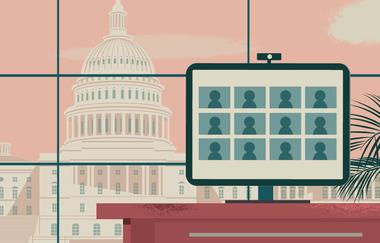
The imperative for social distancing during the coronavirus pandemic has led many of our institutions to quickly adopt new communication technology to enable remote work. The House of Representatives is no exception. In many ways, the pandemic has jumpstarted the House’s modernization efforts — embracing such innovations as enabling digital submissions for bills and co-sponsorships, hosting remote committee proceedings, and investing in the technical infrastructure to enable staff to work from home.
Along these lines, some modernization advocates are urging the House to consider authorizing the use of technology to enable remote voting. While some argue that remote voting is essential to enable continuity of Congress during the pandemic, others express concern that remote voting would impede deliberation and reduce the legitimacy of Congress’s work.
Data from Democracy Fund + UCLA Nationscape™ sheds light on how the public views these tradeoffs. The survey polled a representative sample of more than 6,000 Americans during the week of July 23–29, 2020, and asked the respondents about how Congress should conduct its work during the coronavirus pandemic. Specifically, they were asked which of the following options the U.S. Congress should pursue during the coronavirus pandemic:
The survey found that a majority (57 percent) of Americans preferred Congress to work and vote on legislation remotely using secure technology. Only 9 percent preferred Congress to refrain from working or voting on legislation until it is safe to meet in person, and 11 percent preferred to require Congress to conduct business in person even if it is unsafe to do so. The least popular option — preferred by only 6 percent — was to allow those who can meet in D.C. to make decisions on behalf of those who cannot. Nearly one in five (17 percent) said they do not know what Congress should do during the pandemic.
This pattern of support persists even when the data are broken down by gender, age, race, and geographic region. While Democrats (68 percent) were more likely than Republicans (49 percent) to say that Congress should work and vote remotely, that answer was still the most popular option among Republicans. The second most popular option among Republicans — require Congress to conduct business in person even if it is unsafe to do so — was supported by only 19 percent of that group.
Similarly, remote work and voting remained the majority preference among those who ideologically identify as “very liberal” (58 percent), “liberal” (74 percent), “moderate” (62 percent), and “conservative” (54 percent). Even a plurality of those identifying as “very conservative” favored remote work and voting (38 percent) over having Congress work in person even if it is unsafe to do so (29 percent). Allowing House members in D.C. to make decisions on behalf of those who cannot be in D.C. had the least support among all of these groups, capping at 10 percent among those who are “very conservative,” and 4 to 8 percent among the rest.
The House has many procedural, legal, and even Constitutional considerations when debating the merits of remote voting. However, as a representative institution, Congress may find it useful to understand the public’s views on their procedures as, in the end, it is the public that has the final say on the legitimacy of its work.
Kevin M. Esterling is Professor of Political Science and Public Policy, and the Director of the Laboratory for Technology, Communication and Democracy (TeCD Lab), at the University of California, Riverside. His research focuses on institutional design for communication in democratic politics.
Subscribe to our mailing list for updates on new reports, survey data releases, and other upcoming events.